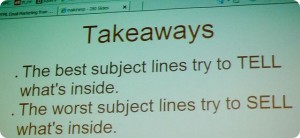In entrepreneurial circles, it’s considered common knowledge that you need to monitor and control your online presence, your social media brand, and make sure that the face you present to your customers is the one they want to see and engage with. But all too often, these suggestions are presented as fait accompli. How do you actually make sure you’re not ruining your business’s reputation online?
Don’t mix business and pleasure
If you have social media accounts as a private user, that’s fine, but make sure that they are separate from your professional ones, and on complete privacy lockdown. At least once a year, some company makes a major gaffe when an employee posts something from a corporate Twitter or Instagram account that they meant to share on their private account.
My suggestion: Don’t login to your personal accounts on the computers and devices you use to post to corporate accounts. Don’t share anything on your business accounts that isn’t business related in some way, and representative of your brand.
Nothing’s private on the Internet, and the Internet is forever
It doesn’t matter how tight the privacy settings claim to be, if you post it on the Internet, you might as well be shouting it on the street corner. And it doesn’t matter how quickly you click “Delete Tweet,” someone saw it, and it’ll exist in cache, and in the Way Back Machine, until we all stop using the Internet. (If no one actually saw it, then you need more social media followers, but that’s a different post.)
My suggestion: Don’t post anything on the Internet that you wouldn’t say in mixed company or email to your grandmother. If you’ve posted something inappropriate accidentally, don’t delete it and hope it goes away. Delete it and acknowledge the gaffe using forthright language.
NO SPAMMING. Just stop.
This really needs to be obvious by now. There are many creative ways to make money, however some people don’t play by the rules. If your customers haven’t given you permission to contact them, don’t. If they have given you permission, be respectful, and make sure that the product or content you send is both rare and relevant. Keep them interested in you, but don’t overwhelm them. Make sure they care. This includes tweets asking people to follow you back so you can DM them. Stop it.
My suggestion: Permission marketing is crucial. People are much more likely to engage with a company on their terms. Be fascinating enough that they come to you by creating top notch content, investing in thought leadership, offering an amazing product, and not skimping on customer service.
Is it all about you?
The goal of social media use as a business isn’t to broadcast your business to all potential customers. Marketing professionals often apply the 80/20 rule to corporate social media accounts, saying that 80 percent of your social media presence should be things that are relevant to your customers. This should be content, discussion, re-sharing (with permission!) of positive customer experiences, and posts that drive attention to your website. The other 20 percent is for announcing your new product lines, sales, and opening locations. The 80 percent keeps your customers engaged and interested so that when your 20 percent shows up, they don’t just fast forward on to the next item in their time line.
My suggestion: Use an editorial calendar for your blog posts and social media posts. Track what you share and match it up against the 80/20 rule. Be ruthless. If you’re not hitting the goal, change things up until you are.
So what do you do if you’re completely at sea about how to create a positive online social media network for your business? You really have two choices.
Get a mentor! This could be someone at your local Chamber of Commerce or SBA Chapter who is a marketing expert, and can help you create a strong online profile. You could also connect with another online entrepreneur whose presence you respect, and ask if they’d be willing to go over some helpful tips with you. You can also watch other social media profiles, see how they do what they’re doing, and learn that way.
Hire someone to help. If it’s all just too overwhelming, outsourcing your marketing is always an option. There are many freelancers, as well as marketing agencies, who work with companies to help them manage the workload of building and maintaining a positive social media presence.
It’s a lot of work to create a great social media reputation. Don’t ruin it by making silly marketing mistakes that you can easily prevent. Some businesses are able to recover from lapses with their customers’ trust, but some are not.
What’s the best advice you’ve heard to maintain your online reputation?
Digital & Social Articles on Business 2 Community(66)
Report Post






